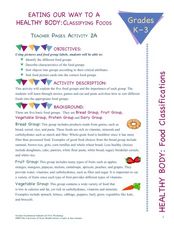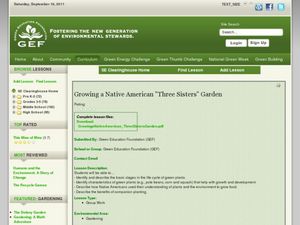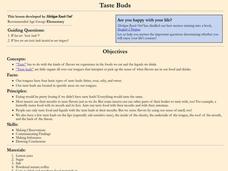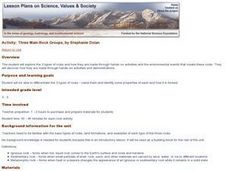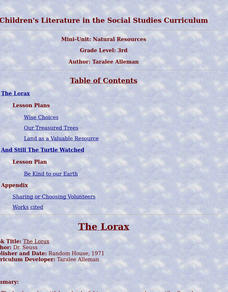Curated OER
The Human Body
Explore the human body through hands-on activities. Young learners will trace their bodies and place cut out body organs in the proper place, print patterns using cut fruit, sing songs about good nutrition, and use their five senses...
Curated OER
Eating Our Way to a Healthy Body: Classifying Foods
Students examine the major food groups. In this classifying foods lesson, students discover the 5 food groups as they read books and play games. Students then sort foods into the appropriate food groups
Curated OER
Growing a Native American "Three Sisters" Garden
Students explore plant life by creating their own gardens in class. In this food growing instructional activity, students discuss the types of gardening methods Native Americans used in order to keep healthy. Students plant corn seeds in...
Curated OER
Habitat Basics
First graders get out and explore two different habitats to examine how each one meets the needs of the plants and animals that dwell there. They discuss what they've learned about animal habitats as they explore the outdoor environment....
Curated OER
THE FOODS WE EAT
Students discuss the five food groups and the seven basic nutrients. They decorate Food We Eat booklet pages with pictures of foods found on background, rubber stamp and animation tools in KidPix. (Booklet has a page for each food group.)
Science Geek
Basic Biochemistry - Carbohydrate, Protein and Fat
You are what you eat, right down to your molecular structure. A hearty presentation begins with the two types of carbohydrates, simple and complex. Then it details proteins and amino acids. It ends by reviewing the three types of fats,...
Curated OER
Taste Buds
Learners investigate taste buds. In this taste buds lesson, students identify the four basic taste buds and their locations on our tongue. Learners participate in an experiment to investigate how our taste buds work.
Science Matters
Oh Heron
Two teams—the environmentalists and herons—play four rounds of the game, Oh Heron. Using hand symbols to represent food, shelter, and water, players locate their match to produce more herons while those unmatched decompose.
Curated OER
Wetland Food Webs
Students study life science. In this food webs and food chains comparison lesson, students examine the wetlands to discover the relationships that exist between the animals that live there. They participate in group activities and...
Curated OER
Food Chains
Students study food chains by creating their own slide show using KidPix. They compare information after sharing their slide shows as a whole group. As the children are watching the slide shows of their peers, they tally every time...
Curated OER
Science Unit Lesson Five
Sixth graders review how and which plants operate in terrariums. In groups, they follow instructions to make their own terrarium and place different types of plants in it. To end the lesson, they review the steps in the water cycle and...
NASA
Biology Training Module
Are you a koalafied biologist? The lesson plan begins with research about human survival and our ecosystem. Then, an online training module simulates the effects of changes to the plants and animals in an ecosystem. Finally, scholars...
NOAA
Through Robot Eyes
How do robots assist ocean explorers in collecting data and images? The final installment in a five-part series has science scholars examine underwater images collected by robots and identify the organisms shown. Groups then calculate...
Curated OER
Internet Scavenger Hunt
Students use a computer and the internet to click on highlighted words to find certain answers. They then write the answer to the questions on paper. Finally, students choose one animal to write about. They research the animal on the...
Serendip
How Do Biological Organisms Use Energy?
When an organism eats, how does food become energy? Young biologists follow glucose through the process of cellular respiration to the creation of ADP using a discussion-based activity. The resource also highlights conservation of mass...
Curated OER
What Food Is It?
Young scholars close their eyes and taste foods without using the sense of sight to identify the foods. They record what they think the food is that they tasted.
Curated OER
Three Main Rock Groups
Students are introduced to igneous, sedimentary and metamorphic rocks. They use foods to demonstrate the basic formation of each type of rock, read books about rock formation and view related videos.
Curated OER
Who Eats Who?
Young scholars recognize that some animals eat plants, some eat meat and some both. In this who eats who lesson plan, students chart animals in a food chain. Young scholars research information from reading articles. Students chart...
Curated OER
Do You Need What I Need?
Student identify the basic human needs. In this life science lesson plan, 3rd graders compare the needs of plants, animals and humans. They apply what they have learned by playing a survival team game.
Curated OER
Ecosystem Game
Students examine the ecosystem by playing a game. In this ecosystem instructional activity, students are put into groups of decomposers, consumers, and producers. Students create a list of animals that fit into each group and items that...
Curated OER
Land as a Valuable Resource
Students investigate why the soil is important to our lives. In this natural resources lesson, students have a farmer as a guest speaker. Students begin to understand how farmers use and protect our natural resource. Students write...
Curated OER
Field Trip to the Watsonville Wetlands
Students explore the differences between food webs and food chains. In this wetland lesson students play a food web game and go on a scavenger hunt.
Curated OER
Principles of Ecology
In this ecology worksheet, students will review 10 vocabulary words associated with the basic principles of ecology. This worksheet has 10 fill in the blank questions.
Curated OER
The Living Environment
For this living environment worksheet, students complete a crossword puzzle given 34 clues about the various species in the environment that produce, consume and decompose. Topics also include photosynthesis, respiration, glucose,...



